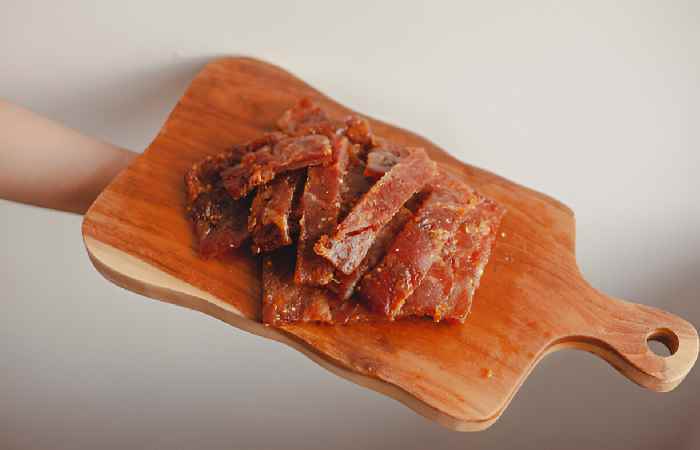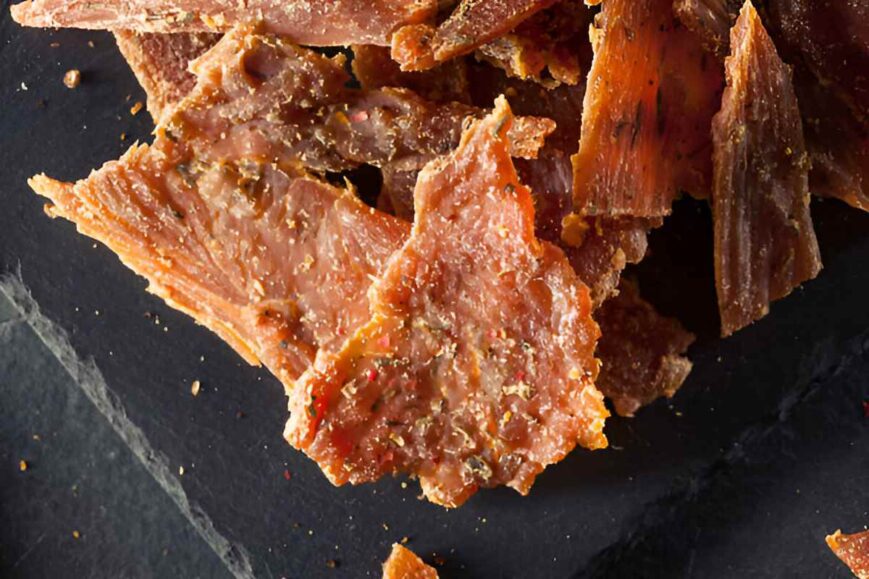Is Beef Jerky Healthy? – Today in this article we will discuss beef jerky. It is a popular and convenient snack food. Beef jerky is prepared from dried beef that has been marinated with many sauces, spices, and other additives. It then goes through various procedures such as pickling, smoking, drying, etc., and is then packaged and sold. Since it is considered a dried snack, many people wonder whether it is a healthy or unhealthy option.
Let’s find out the nutritional values of beef jerky

Generally speaking, beef jerky is a healthy and nutritious snack.
One ounce (28 grams) of beef jerky consists of the following nutritional values:
- Protein: 9.4 grams
- Calories: 116
- Carbs: 3.1 grams
- Fat: 7.3 grams
- Zinc: 21% of the Daily Value (DV)
- Fiber: 0.5 grams
- Iron: 8% of the DV
- Vitamin B12: 12 % of the DV
- Phosphorus: 9% of the DV
- Choline: 6% of the DV
- Folate: 9% of the DV
- Copper: 7% of the DV
- Selenium: 5% of the DV
- Potassium: 4% of the DV
- Magnesium: 3% of the DV
- Thiamine: 4% of the DV
- Niacin: 3% of the DV
- Riboflavin: 3% of the DV
Besides the above-mentioned nutrients, it also provides tiny amounts of manganese, molybdenum, and pantothenic acid.
Because of its high protein content and low carbohydrate content, it has a higher nutritional value than many other snacks and is suitable for many diets, including non-dairy, low-carb, and paleo.
Beef jerky is also a rich source of several minerals which include iron, and zinc which play a vital role in performing many functions of the body including immune and energy level support.
What’s more, beef jerky has a long shelf life and is easily transportable, making it a great choice for traveling, backpacking, and other situations where you don’t have access to fresh food and need a protein boost.
Drawbacks of beef jerky
Although beef jerky is a highly nutritional snack it should be consumed moderately.
- It is high in sodium, as one ounce (28 grams) of beef jerky provides about 22% of your daily value of sodium. High sodium intake harms your health as it can be harmful to your heart, brain, and blood flow in the body
- Beef jerky is a highly processed snack that can lead to a higher risk of cancers, such as gastrointestinal cancers.
- Recent studies have also shown that dried meats, such as beef jerky, may contain toxins called mycotoxins, which are produced by bacteria growing on the meat and these mycotoxins are linked to cancer.
While beef jerky is healthy, don’t eat too much of it because it’s high in sodium and can be just as dangerous as processed meat.
How to prepare beef jerky at home?
Making dried meat at home is not a big deal. By making the jerky at home you can also control various ingredients, particularly sodium.
- When making homemade beef jerky, use only lean cuts of beef, such as top sirloin, eye of round, bottom of round, sirloin, or flank steak, and cut the beef into thin slices.
- Marinate the meat in your choice of herbs, spices, and sauces as you slice it. Then pat the jerky strips dry, remove any excess marinade, and place them in the meat at 155-165°F (68-74°C) for about 4-5 hours (depending on the type of meat).
- If you don’t have a pressure cooker, you can achieve similar results using a low-temperature oven (approximately 60 – 75°C) for 4 – 5 hours.
It’s also a good idea to let the beef jerky dry at room temperature for 24 hours before packaging. If you don’t plan on eating the jerky within 1 week, it’s best to freeze it.
Conclusion
Beef jerky is a great snack though consumed moderately as it is high in protein and a good source of many minerals, including zinc and iron. There are other risks, too, so it’s best eaten in moderation as part of a variety of foods.


